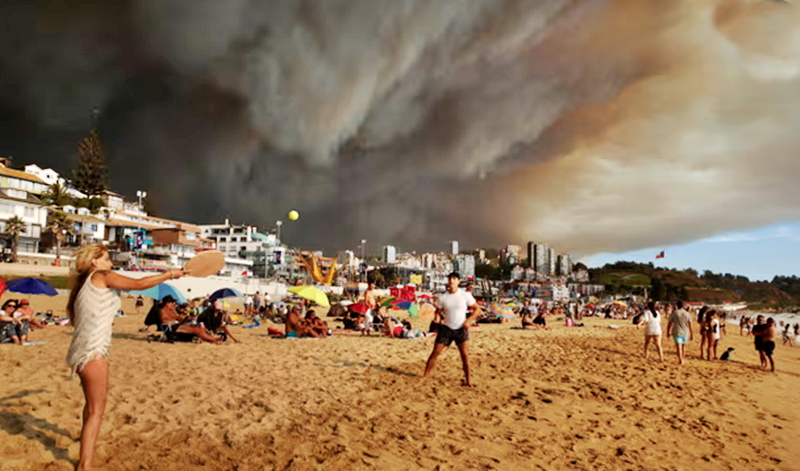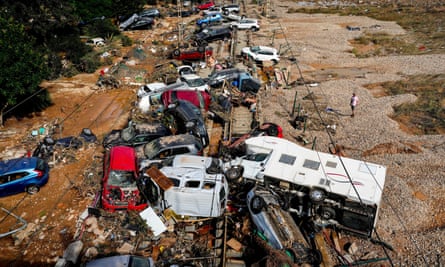Global boiling, mass flooding and Trump: 10 big talking points for Cop29

By Guardian - Robin McKie- Sat 9 Nov 2024 12.43 GMT
Record carbon emissions, melting ice sheets and the return of the former US president will all be under the spotlight at this week’s climate summit. It has been a remarkable year for meteorological mayhem with intense heatwaves and storms of extreme intensity battering many parts of our planet. Last month these culminated in the devastating floods that struck eastern Spain and killed hundreds.
Ahead of this week’s Cop29 summit, scientists believe disasters like these are becoming more frequent because major changes in our climate are occurring as emissions from the burning of fossil fuel continue to rise.
As a result, they have forecast that 2024 will probably have been the warmest on record, with global average temperatures expected to end up more than 1.5C above pre-industrial levels. Nor is this rise likely to plateau in the near future.
There is clearly much to discuss at Cop29 – here are ten of the biggest issues that will be on the minds of delegates this week.
Breaking records
Global carbon emissions are continuing to increase. Last year they reached a staggering 40.6bn tonnes, a record that is expected to be broken by the end of 2024. Atmospheric carbon levels are now more than 50% higher than they were in pre-industrial days. Hence that 1.5C rise. Unfortunately the world’s response to this disturbing worsening of atmospheric affairs has been painfully slow.
The heat is on
At last year’s Cop28 summit in Dubai it was agreed to “transition away” from fossil fuels. Remarkably, this was the first time an international commitment to tackle, explicitly, the root cause of our climate crisis had been agreed. In other words, it has taken three decades of negotiations to get to the state where this fairly weak commitment could be accepted globally, even though it falls far short of the full-blooded phasing out of fossil fuels for which many countries and most activists have been pressing. The arrival of Donald Trump is unlikely to help their cause.
America
Trump’s victory in the US presidential election last week casts a particularly bleak shadow over the already gloomy preparations that are being made for this week’s Cop29 climate summit in Baku, Azerbaijan. European Commision president Ursula von der Leyen and French President Emmanuel Macron are among those not expected to attend and there is fear that the breakthroughs hoped for will not happen..
The ‘big hoax’
Into this arena strides Donald Trump, a man who has described climate change as “a big hoax”, and is expected to repeat the decision – made during his last presidency – to withdraw the US from the landmark Paris agreement when he takes office. “There is just the faintest ray of hope now that the world will limit global warming to 1.5C, but Donald Trump may extinguish it,” said Bob Ward, policy director at the Grantham Research Institute on Climate Change and the Environment.
Boiling point
In contrast to the views of Trump, the UN secretary general António Guterres has been particularly outspoken in his warnings about the dangers that our planet now faces in the run-up to Cop29, talking of humanity committing “collective suicide” and accusing fossil fuel companies of having “humanity by the throat”. The era of global warming has ended, he has argued and “the era of global boiling has arrived.”
Tipping over
Alarm over Earth’s climate is based, in part, on researchers’ warning that the 1.5C rise in global temperatures – which the climate negotiators had hoped to avoid – is likely to be breached over multiple years by the end of the decade, while many other climate researchers fear that holding the heat down below a 2C rise is likely to prove impossible as well.
In such a scenario, major tipping points are likely to be passed. These will include the destabilisation of the Greenland and West Antarctic ice sheets, the abrupt thawing of the world’s permafrost regions, the collapse of the North Atlantic Ocean Circulation, and the massive die-off of tropical coral reefs. Widespread flooding will ensue and temperatures will continue to rise, while deadly droughts and storms will increase in frequency. Hundreds of millions of people – mostly those in developing nations – will find their homelands no longer habitable.
Follow the money
Trying to prepare for the climatic misery that threatens to engulf the world will form the main thrust of Cop29. A new finance goal to help developing nations create green energy systems and to help them adapt to a warming world is high on the agenda over the next fortnight’s negotiations.
The sums of money involved are eye-watering. Most estimates suggest that developing countries will need an additional $500bn to $1 trillion per year in climate finance from international sources. That’s at least five times as much as the $100bn commitment that is currently in place.
Much of this money would come from companies and private investors as well as the multilateral development banks and would be spent on protecting threatened landscapes, creating energy sources suitable for developing countries, adapting infrastructure to be more resilient to a changing climate, and paying for the damage that a nation has suffered from global warming that has been triggered by emissions generated by developed countries.
Gaslight
It remains to be seen how far these plans will progress at Baku over the next two weeks. Hopes of breakthroughs – already at a low level – have been further depressed by the disclosure that a senior official in Azerbaijan’s Cop29 team, Elnur Soltanov, was filmed discussing “investment opportunities” in the country’s state oil and gas company with a man posing as a potential investor. “We have a lot of gas fields that are to be developed,” he says. These remarks have gone down badly with many delegates.
Stepping stone
There remains some prospect of success at Baku, however. “We should look at the meeting in Baku as a stepping stone for Cop30 in Brazil,” said Lord Stern, chairman of the Grantham Research Institute. “Successful Cop meetings often come in pairs and hopefully this will be an example,” he said last week. “I would be cautious about specific agreements and outcomes but I am hoping we can get at least some framework for climate finance which could be finalised at Cop30.”

Next year, at Belém on the Amazon, countries must arrive with fresh national plans – known as nationally determined contributions (NDCs) – enforcing more stringent cuts to greenhouse gas emissions than they have yet promised. These must be in line with the globally accepted aim of limiting global temperature rises. A strong agreement in Baku on finance for developing countries would encourage higher ambitions.
Running out of time
The problem is that the world is running out of time, a point stressed by Johan Rockström, of the Potsdam Institute for Climate Impact Research. “With Trump’s win, we now face, at best, a repeat of his last term’s climate inaction – a four-year pause we simply can’t afford in this critical decade.”
However, a more optimistic take on the situation was provided by Stern. “I was in Marrakech for the Cop22 summit in 2016 when the news came in that Trump had won the election,” he told the Observer. “We knew what that meant, but it was remarkable how strong was the resolve among delegates that we keep going. And we will keep going this time as well.
“His presidency will make life more difficult but we are not going to give up. That would be the worst possible option.”

Robin McKie - Guardian - Climate Editor

Editors remarks.
I hope indeed Trump will stop the military etc. from meddling with our weather system, they have done insatiable dammage already to natures regular CHAOS THEORY which may take decades to repair.
